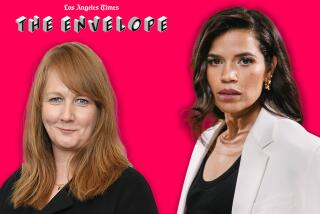HAVING FUN WITH CLASS CLASHES IN ‘LAUNDRETTE’
Stephen Frears is a jovial, witty 44-year-old Englishman who still can’t quite get over all the acclaim heaped upon “My Beautiful Laundrette,” a low-budget 16-millimeter movie he directed for British television.
Now in 35 millimeter, “My Beautiful Laundrette” has become a critical and box-office success in the United States as well as in Britain. In Los Angeles, it is playing on three screens at the Beverly Center Cineplex.”I’m the idiot who said it had to be for TV, but that’s probably just as well,” explained Frears during a brief trip here. “I think we’d still be raising the money if we told people we wanted to make a movie about a gay Pakistani launderette. Yes, that is a spelling mistake we made--’laundrette’ sounds like one of those Pagnol films! We made it for under 600,000 pounds--that’s about $850,000.”
The launderette in question is run by an ambitious Pakistani (Guyana-born Gordon Warnecke) and his handsome lover (Daniel Day Lewis), who’s from the ranks of the National Front, tough street youths who resent the incursion of Pakistanis in South London. For Frears, the film was the chance to have fun with, as well as elicit pathos for these clashes, the product of working-class despair and a striving by the Pakistani for British-style upper-middle-class affluence.
“The script came to me through the letter box, but the writer, Hanif Kureishi, whose father is Pakistani and whose mother is English, had a sort of plan to get it to me,” said Frears. “I knew of him, but I mixed him up with somebody else. I read it, thought it was wonderful and told him, ‘I’d like to make this, but now .’ That was possible because in England the lines between TV and movies are more blurred than in America; there’s always the possibility for a television movie to play the cinemas first.
“I took it as a film about economics, not race, and I told Hanif that it wouldn’t be the same as if a Pakistani directed it. We just made it, no problems at all. As for the gay relationship, it was so logical, so wonderful and romantic we never questioned it--if you’re going to stand things on end, you might as well see it through. We wanted the love story to be very romantic. Kissing under the moonlight on Mulholland Drive like in ‘Rebel Without a Cause’--like a high school picture.
“We took the film to the Edinburgh Festival just to make us feel good. The English film critics discovered it and wrote wonderfully about it. Then it went to Toronto, where it was bought for America by Orion Classics.”
Frears has more than earned his plaudits. Starting out in the theater, where he became an assistant to Karel Reisz, Frears signed on as an assistant on Reisz’s “Morgan!” He was later an assistant to Lindsay Anderson on “If . . . “ and to Albert Finney on “Charlie Bubbles.” Between “Gumshoe” (1971), a private-eye spoof starring Finney, and “The Hit,” a 1984 crime thriller, Frears made more than two dozen films for British television. (One of them, “Bloody Kids,” a riveting work centering on a disturbed 12-year-old, was shown at Filmex in 1981 but wasn’t picked up for American distribution.)
“I stayed in TV because the work was so good,” said Frears. “It’s like Fox in the ‘40s; you can work with continuity and stability. You’re always given a great deal of freedom, and you have the opportunity to learn your job quietly. You get to work with the best actors in England, and the only pressure is to be good and stay within budget. But I’ve started to get itchy; now I want the bigger screen with bigger budgets.
“Right now, I’m not sure if I’m unemployed or if I’ve got three films. I’m getting entangled in this world where you spend lots of time talking about impossible deals. All this discussion is very debilitating. But I could be doing an American road movie by the man who wrote ‘After Hours” (Joseph Minion), and I’ve long wanted to make a film about Joe Orton--his biography, ‘Prick Up Your Ears.’ It has jokes, passion--everything that makes life worth living! And I’ve got a romantic thriller in India for Ismail Merchant.”
In the meantime Frears is content with the unexpected popularity of “My Beautiful Laundrette.”
“Young people began to find it--this almost never happened before in England,” he said. “It’s not been treated like it was the new Fassbinder, but with tremendous affection. The most controversial thing has been the Pakistani girl showing her breasts. Within the Asian community that was controversial.
“We’re standing up and being cheeky about Mrs. Thatcher, and I think audiences are responding to that. In England the spirit is so broken in bad areas, I think people like hearing mockery again.”
More to Read
Only good movies
Get the Indie Focus newsletter, Mark Olsen's weekly guide to the world of cinema.
You may occasionally receive promotional content from the Los Angeles Times.










